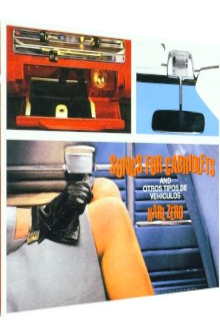
Karl Zéro
Songs For Cabriolets
2000
Finally there is someone who ridicules Exotica listeners and Europeans in a tasteful way. Exotica fans are always on the run for the most obscure records, and especially the male population of this group knows the cup size of each front cover’s female model by heart. We look at their eyes, wonder what has become of the beautiful women’s careers, and long for the good old days that we would have liked to experience ourselves. Now match these nostalgic feelings with a synopsis of every French cliché, cultural anomaly and aesthetic peculiarity you can find, and you’ve got Songs For Cabriolets And Otros Tipos de Vehiculos by Karl Zéro.
A Frenchman and universal genius himself, Zéro has done it all: he has written Punk music in his youth, recorded a few albums of 40’s and 50’s pop music as well as several Calypso songs, refined stand-up comedy and witticism in his country and went on to host political talk shows. Best of all: quite a lot of tracks of this record have been featured on an original X-Files episode of 2002! Say what? These achievements show the ambivalent character of a man who is capable of entering several areas of art and twists them in funny ways without neglecting the qualitative aspects. Songs For Cabriolets is conducted by Adonis Ladopoulos and has been recorded over a period of six months in various exotic locations such as Acapulco, Corfù and Portofino. Say what you will, but it is rare these days that records are formed and developed in such a variety of places. The record therefore encapsulates all the colorful landmarks and hot summery temperatures of those locations which are themselves transformed into music via shimmering brass sections, paradisiacal flutes, warm acoustic guitars and quavering organs.
Everything Zéro delivers has to be taken with a grain of salt, for even supposedly melodramatic tunes are all of a sudden stuffed with less melancholic opprobriums and tirades. 14 songs are compiled, most of them high-quality renditions and, most important to me, four of them being unique compositions by Zéro and his illustrious contributors. French, Spanish and Italian lyrics are intertwined, and you really get to know that faux-European feeling which is a huge distinctive feature of the record, for fake African rituals and Polynesian jungles have been recreated in music often enough. It’s time for a change, and Karl Zéro delivers it as follows.
The album starts with the traditional song Poinciana, but changed slightly to Ponciana here. Exotica fans know the various incarnations of the tune, conducted and played by big names such as Bert Kaempfert, Tak Shindo or the Kokee Band, but you haven’t heard it quite like this. While the music-related setup is conventional and lives up to the listener’s expectation due to its sunset guitar chords, careful bongo beats and the original lyrics sung by a tentatively drugged choir, Karl Zéro ridicules their efforts by whispering amorously cantillated words on top of their performance like "Ce disque, c’est ton disque, c’est notre disque", and just to make sure that everyone is able to grasp the meaningful sapience, Zéro continues "this record is for you, este disco es paradis." The pompousness of the song is thus switched completely, what has once been a song of coruscating beauty is now interwoven with crosspurposes and curlicues.
The next song is a brass-laden French accent interpretation of William Best’s 1945 I Love You (For Sentimental Reasons). Best of all: it is tremendously catchy! A Mediterranean-style acoustic guitar is used as a backing device for the verses, while chorus and bridges unite the sizzling-hot staccato wind players with mellifluous flute melodies. The good mood is further stoked up by the cheeky La Pansé, a gourd-centric double bass Parisian anthem. If you are a fan of Irv Cottler’s rustic renditions of Sorrento And Santa Lucia or Under Paris Skies off his album Around The World In Percussion, you will appreciate Zéro’s performance and the prankish uproar of the backing choir.
While Richard Egües’ Cuban smash hit El Bodeguero picks up the threads of I Love You (For Sentimental Reasons) and transports them into Spanish territory by enhancing the Latin joy of living with a hot-blooded swing, slightly melancholic trumpets and a partying Karl Zéro who ridicules the English pronunciation of his Latin combatant Henry Salvador, the classic Portofino turns up the melancholic factor a notch or two due to the downbeat Latin piano, field recordings of gentle ocean waves and a doleful Karl Zéro who delivers a tremendously jocular performance with one too many f-words that are interspersed with German and Italian banters.
The following song Ça va ça va is a Zéro original and possibly his most famous signature tune full of exhilarative organ prowess, joyful lyrics and a gargantuan staccato brass interlude. This entirely French song about travel adventures in a car is highly addictive and the glitziest pop song of the album. It is remixed by French DJ Le Tone at the end of the album with filtered brass sections, wonky bass lines, punchy beats and quirky laser sounds. Apart from all these electronic bits, the remix stays true to the original.
The second half of the album is equally weird and varied, ranging from the cheesy masculinity ritual of Renato Carosone’s Torero with solemn brass blasts, a Cha Cha rhythm, rustic piano-desperado-guitar combos and the filtered voice of Zéro that sounds like it’s coming out of a transistor radio, over the dulcet-strident oxymoronic If Love Is Good To Me with feisty flutes and bubbly brass instruments, to the iconic – iconic I say! – Io Mammate E Tu (which translates as Me, Your Mother and You), a hilarious duet of Zéro with Eric Laugérias. Strolling gourds, lamenting bachelor lyrics and clarion percussion may trigger your trochlear nerve, but this is one of the funniest tunes ever, even if your Italian language skills only cover the food-related vocabulary. A killer track that has to be heard to be believed!
Porque Es Asi, a Zéro co-production, is the liveliest, fastest track that finally features accordion melodies, joyous guitars, hammering percussion and whinny horses, while the final Rico Vacilon is a pan-European production with several languages that enhances the cuteness factor to the extreme to a brother and his sister who sing cheerfully about their father Rico Vacilon. However, Señor Vacilon just wants to sleep-in a little longer as he has a hangover. Their mother has to explain the situation to them while they keep on singing the refrain, sometimes forgetting about the current verse. Absolutely cute, and since the galloping Cha Cha groove and the honky-tonk piano add tremendously to the atmosphere, this could well be the ultimate Karl Zéro track that intermixes European clichés with jocularity, an exotic groove and a unbelievably catchy melody. A track to root for!
Karl Zéro delivers a gorgeously melodious, playful Latin Exotica album that stands the test of time and delivers something new to each interpretation he risks to take on Songs For Cabriolets. The album offers something entirely different depending on where you live and where you are coming from: Italians, Frenchmen and Spaniards will shake their heads in disdain. "That’s not us, this isn’t our culture, that’s a cliché and a lie!" Bravo, ladies and gentlemen, that’s exactly what Karl Zéro wants his album to depict. Now you know how Polynesians feel when they hear Les Baxter’s Quiet Village. And what about the Africans (a supposedly unified group of humans that doesn’t exist anyway) who listen to Tak Shindo’s Bantu Spear Dance off his album Mganga!?
You see, the templates of stereotypes never fit reality, especially not today. That’s why this album is so refreshing! Central Americans will see something divergent in this album, for they may appreciate the Cha Cha and grooves – which are kitschy themselves – and the brass sections. U.S. Americans, on the other hand, who believe that Io Mammate E Tu displays the true life of typical settlements in rural Bella Italia or at least contains a pinch of truth may find themselves reflecting over a supposedly Easy Listening-Latin-Exotica mélange. The album, thus, is a success on a non-music-related level as well, which is quite alienating for this kinds of albums. It was used on the X-Files for these very reasons; the episode wasn’t about a mass-murdering monster, but about God playing dice. This obscurity was perfectly captured by Zéro’s music, and I can wholeheartedly recommend the album to virtually every Exotica listener out there.
Enough of the Polynesian, African and Japanese clichés found in the Golden Age Exotica records – let’s laugh about Europe this time while always keeping in mind that our laughter may change into bewilderment and sudden outbursts of coziness and shelter, for Zéro’s saccharine compositions are catchy and hark back to the romantic melodies of Nelson Riddle, James Last and other grandseigneurs of the Easy Listening genre who took Spanish, Italian and French vistas into account long before Zéro. Go listen to this effervescent cocktail, you won’t be disappointed. At least give Rico Vacilon a chance. It’s soooo cute.
Exotica Review 066: Karl Zéro – Songs For Cabriolets (2000). Originally published on May 5, 2012 at AmbientExotica.com.
